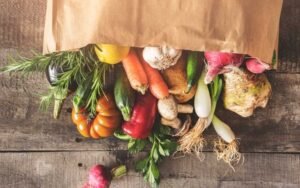Harmful Raw Vegetables: Raw vegetables are commonly praised for their nutritional value, fiber content, and variety of health benefits. However, it is essential to be aware that some raw vegetables can carry potential risks and pose harm to our health if consumed incorrectly. In this article, we will explore a few types of raw vegetables that can be harmful and the reasons behind their potential dangers.
Read this also: The Power of Shilajit: Health Benefits for Women
Know which are the harmful raw vegetables

1. Cruciferous Vegetables
Cruciferous vegetables, such as broccoli, cauliflower, cabbage, and Brussels sprouts, are widely recognized for their numerous health benefits. However, when consumed raw in excessive amounts, they can lead to digestive issues due to their high fiber content. These vegetables contain compounds called goitrogens, which can interfere with thyroid function when consumed in large quantities, particularly in individuals with existing thyroid conditions. Cooking these vegetables can deactivate the goitrogens, making them safer to consume.
2. Leafy Greens
Leafy greens, such as spinach, kale, and lettuce, are highly nutritious raw vegetables that provide essential vitamins and minerals. However, these vegetables can sometimes be contaminated with harmful bacteria like E. coli, Salmonella, or Listeria. This contamination can occur during the growing, harvesting, or packaging processes. To reduce the risk of bacterial infection, it is crucial to thoroughly wash leafy greens before consuming them, using clean water and gentle rubbing to remove any potential bacteria.
3. Nightshade Vegetables
Nightshade vegetables, including tomatoes, potatoes, peppers, and eggplant, contain a naturally occurring compound called solanine. Solanine can be toxic when consumed in high amounts or if the vegetables are not properly cooked. Green and sprouted potatoes, for example, contain higher levels of solanine and should be avoided. Cooking these vegetables at high temperatures can help break down solanine, eliminating its potential harmful effects.
4. Bean Sprouts
Bean sprouts, such as those from mung beans or alfalfa, are a common addition to salads and sandwiches. However, they have been associated with foodborne illnesses, particularly due to bacterial contamination. The warm and humid conditions required for sprouting beans are also ideal for bacteria growth. Eating raw or undercooked bean sprouts can cause digestive problems and increase the risk of bacterial infections. It is advisable to cook bean sprouts thoroughly to eliminate potential harmful bacteria.
While raw vegetables are generally considered healthy, it is important to be aware of potential risks associated with certain types. Cruciferous vegetables, leafy greens, nightshade vegetables, and bean sprouts can pose harm if consumed incorrectly. Proper cooking, washing, and storage techniques can help mitigate potential dangers and ensure the safe consumption of these vegetables. Maintaining a balanced and varied diet while adopting appropriate food safety practices will allow us to enjoy the benefits of raw vegetables while minimizing any potential risks to our health.